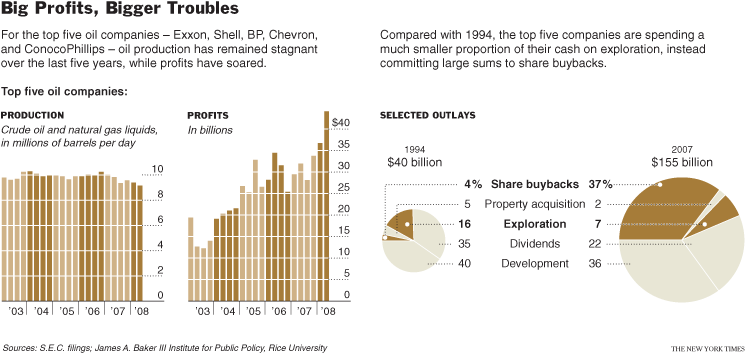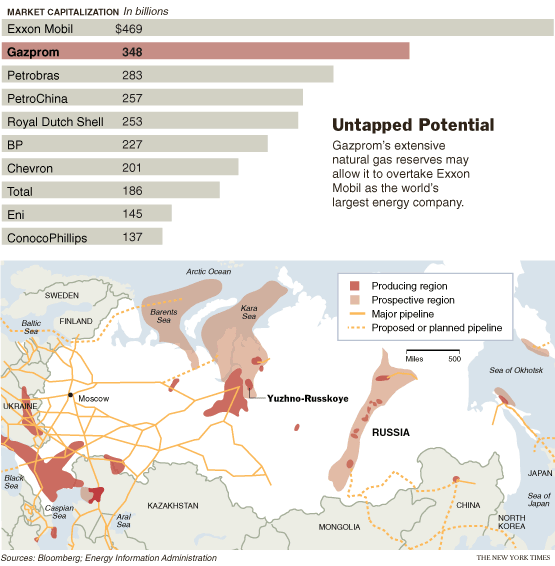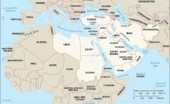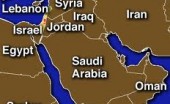Re Ian Bremmer 'Could third-party candidates upend the 2024 US election?' 3 April The current political movement in the USA…
Oil & Power
Written by Diana Thebaud Nicholson // August 25, 2008 // Economy, Geopolitics, Middle East & Arab World, Oil & gas, Sovereign wealth funds // Comments Off on Oil & Power
Excellent selection of readings suggested by one of our favorite sources
Petrodollar bonanza offers economic key
(FT) At today’s prices, the value of oil in the ground exceeds the combined value of all the world’s equity and debt markets.
Oil-importing nations are paying oil-exporting nations roughly $1,500bn per annum for oil – about 2.5 per cent of global gross domestic product – by some measures the biggest income transfer in history.
…Of course no-one knows what the long-run price will be, but at current prices the value of oil in the ground is $162,000bn (€107,659bn, £84,401bn) – more than the total value of all equity markets ($52,300bn) plus all debt markets ($67,000bn.)
Indeed it almost exactly equals the total value of all tradeable financial assets, which the McKinsey Global Institute estimated was $167,000bn at the end of 2006.
As Oil Giants Lose Influence, Supply Drops
(NYT) Oil production has begun falling at all of the major Western oil companies, and they are finding it harder than ever to find new prospects even though they are awash in profits and eager to expand.
Part of the reason is political. From the Caspian Sea to South America, Western oil companies are being squeezed out of resource-rich provinces. They are being forced to renegotiate contracts on less-favorable terms and are fighting losing battles with assertive state-owned oil companies.
And much of their production is in mature regions that are declining, like the North Sea.
The reality, experts say, is that the oil giants that once dominated the global market have lost much of their influence — and with it, their ability to increase supplies.
 |
||
|
|
||
The new seven sisters: oil and gas giants that dwarf the west’s top producers
When an angry Enrico Mattei coined the phrase “the seven sisters” to describe the Anglo-Saxon companies that controlled the Middle East’s oil after the second world war, the founder of Italy’s modern energy industry could not have imagined the profound shift in power that would occur barely half a century later.
As oil prices have trebled over the past four years, a new group of oil and gas companies has risen to prominence. They have consolidated their power as aggressive resource holders and seekers and pushed the world’s biggest listed energy groups, which emerged out of the original seven sisters – ExxonMobil and Chevron of the US and Europe’s BP and Royal Dutch Shell – on to the sidelines and into an existential crisis.
The “new seven sisters”, or the most influential energy companies from countries outside the Organisation for Economic Co-operation and Development, have been identified by the Financial Times in consultation with numerous industry executives. They are Saudi Aramco, Russia’s Gazprom, CNPC of China, NIOCof Iran, Venezuela’s PDVSA, Brazil’s Petrobras and Petronas of Malaysia.
Overwhelmingly state-owned, they control almost one-third of the world’s oil and gas production and more than one-third of its total oil and gas reserves. In contrast, the old seven sisters – which shrank to four in the industry consolidation of the 1990s – produce about 10 per cent of the world’s oil and gas and hold just 3 per cent of reserves. Even so, their integrated status – which means they sell not only oil and gas, but also gasoline, diesel and petrochemicals – push their revenues notably higher than those of the newcomers.
Robin West, chairman of PFC Energy, an industry consultancy, says: “The reason the original seven sisters were so important was that they were the rule makers; they controlled the industry and the markets. Now, these new seven sisters are the rule makers and the international oil companies are the rule takers.”
Graphic showing market cap statistics for oil majors
Nationals’ champion: How the energy-rich rely on Schlumberger
Andrew Gould is quietly becoming one of the most powerful men in the oil industry, so much so that he feels compelled to reassure the world’s biggest energy groups that he has no intention of making them redundant. “We do not, cannot and would not replace what oil companies do with things we can’t do,” says the chief executive of Schlumberger, the world’s largest oil services group, in a rare interview.
Yet the list of things Schlumberger cannot do has shrunk so dramatically that many national oil companies (NOCs) can now forgo the costly and politically tricky step of forming partnerships with international oil companies to tap their own oilfields. For the likes of ExxonMobil, BP and Royal Dutch Shell, that means losing the most lucrative part of their business – the part they have relied on to achieve growth in production, revenue and reserves for much of their existence.
Euan Baird, Mr Gould’s predecessor, liked to quip that when he joined Schlumberger, on an assignment to Shell Brunei in the 1960s, the only service Shell did not itself own was wireline logging – measuring rocks by feeding cables with sensors down oilfield boreholes. That shifted gradually over the following decades, as low oil prices prompted Shell and others to shed their oil services divisions, shutter their research labs and sever their ties with a generation of engineers and geologists.
Schlumberger and others stepped into the void and since have been in a sense democratising the industry, enabling NOCs and small independent operators to chip away at the energy majors’ market share. As crude prices rose to record highs, that paid off for all involved. Now, the industry is entering its next phase – and one question is whether the oil services groups will be able to take on the task of helping the oil majors extract crude from the world’s most difficult deposits.
Irrelevant? OPEC Is Sitting Pretty
The key is oil reserves. In a nutshell, OPEC has plenty, while the rest of the world, including the United States, is quickly pumping itself dry.
Far from waning, then, OPEC’s hold on the oil market, and thus on the world economy, looks set to grow sharply in the coming decades, with profound economic and geopolitical implications.
As alternative sources of oil dwindle, so, too, will the United States’ room to maneuver in dealing with OPEC, and especially with the five states around the Persian Gulf that are richest in reserves: Saudi Arabia, Kuwait, the United Arab Emirates, Iraq and Iran.
Those five gulf countries possess 61 percent of the world’s proven oil reserves, according to the latest statistics compiled by BP. Add the other six members of OPEC, and the cartel controls three-quarters of the world’s 1.15 trillion barrels of reserves.<
…Multinational oil companies are already worried. “As the absolute amount of energy provided by OPEC countries has grown, as well as OPEC’s share of the total, voices of concern over security of supply have increased,” said Lee R. Raymond, the chief executive of ExxonMobil, speaking at an industry conference in Vienna last month. “It will be difficult to calm these concerns.”
The oil companies want desperately to regain access to the gulf’s reserves, but they have been locked out for decades. Many OPEC countries have state oil monopolies, most notably Aramco in Saudi Arabia, which the country nationalized in 1980, and the five reserve-rich gulf nations all sharply restrict foreign investment and influence over their oil industries. (So do many other oil producers, like Mexico and Brazil.)
Who’s Dependent Now?
Prof. Ken Rogoff
Today, however, with Asia’s giants, India and China, joining the global economy, prices for oil, gold, wheat, and virtually every other commodity are exploding. While there will always be cycles – oil prices, for example, will probably fall before they start rising again – the long-run trend for many commodities will clearly remain upward for some time to come.
What many trade negotiators and other policymakers do not seem to have recognized yet, though Prebisch would have realized it instantly, is that this dramatic turn of events carries huge implications for the global balance of power. Indeed, perhaps no other aspect of economic globalization will pose greater challenges to world leaders over the coming decades.
Jan 2006
Field work: why Kuwait’s rulers are being forced to ponder a new pact with big oil
(FT Analysis) From the Middle East to the North Sea, and Alaska to Latin America, the large oil fields on which the world has come to rely to fuel its economic expansion since the second world war are requiring increasingly advanced technology and know-how to coax their last oil barrels to the surface.
Whether or not Kuwait and its fellow petrostates, in particular Saudi Arabia and Mexico, invest enough – in many cases by turning to foreign companies for support – will be the biggest factor in determining the oil price in the coming decades. Iran and Iraq are the other key players but there foreign investment is necessarily limited by international politics and security issues. So companies and consumers alike have particular reason to worry about the outcome of the Kuwait debate.
It has also underlined the recent shift in the balance of power between national and international oil companies. The national oil companies are flexing their muscles at home and, increasingly, abroad, arguing that service companies such as Halliburton and Schlumberger can give them all the technical support they need. But Kuwait and other countries whose oil reserves cannot be reached without sophisticated technology reveal the flaws in that model.
Meanwhile, being allowed back into Kuwait is arguably as important for the future of the big international energy groups as Project Kuwait is for the country itself.
…It is crucial for the oil majors’ future that they win the day. With few, if any, big oil fields left to find, the big western companies are facing shrinking production and reserves. They are forced to venture into riskier spots such as the harsh terrain of Siberia’s Sakhalin island where extracting a barrel of oil can cost 6-7 times as much as it does in Kuwait.
Returning to Kuwait would not be an immediate boon because the contract’s terms are too restrictive. But regaining a foothold in the Middle East is of great strategic importance, explains Alastair Bee, who spent six years working in Kuwait for BP.
“[For] any big oil company, having part of its portfolio in the Middle East is a big plus because 10 years on, it’s the place to be.” Kuwait, Iran, Iraq, United Arab Emirates and Saudi Arabia hold two-thirds of the world’s oil reserves.
Deals With Iraq Are Set to Bring Oil Giants Back
Four Western oil companies are in the final stages of negotiations this month on contracts that will return them to Iraq, 36 years after losing their oil concession to nationalization as Saddam Hussein rose to power.
Exxon Mobil, Shell, Total and BP — the original partners in the Iraq Petroleum Company — along with Chevron and a number of smaller oil companies, are in talks with Iraq’s Oil Ministry for no-bid contracts to service Iraq’s largest fields, according to ministry officials, oil company officials and an American diplomat.
The deals, expected to be announced on June 30, will lay the foundation for the first commercial work for the major companies in Iraq since the American invasion, and open a new and potentially lucrative country for their operations.
The no-bid contracts are unusual for the industry, and the offers prevailed over others by more than 40 companies, including companies in Russia, China and India.
…For an industry being frozen out of new ventures in the world’s dominant oil-producing countries, from Russia to Venezuela, Iraq offers a rare and prized opportunity.
While enriched by $140 per barrel oil, the oil majors are also struggling to replace their reserves as ever more of the world’s oil patch becomes off limits. Governments in countries like Bolivia and Venezuela are nationalizing their oil industries or seeking a larger share of the record profits for their national budgets. Russia and Kazakhstan have forced the major companies to renegotiate contracts.
U.S. Advised Iraqi Ministry on Oil Deals
A group of American advisers led by a small State Department team played an integral part in drawing up contracts between the Iraqi government and five major Western oil companies to develop some of the largest fields in Iraq, American officials say.
The disclosure, coming on the eve of the contracts’ announcement, is the first confirmation of direct involvement by the Bush administration in deals to open Iraq’s oil to commercial development and is likely to stoke criticism.
In their role as advisers to the Iraqi Oil Ministry, American government lawyers and private-sector consultants provided template contracts and detailed suggestions on drafting the contracts, advisers and a senior State Department official said.
…At a time of spiraling oil prices, the no-bid contracts, in a country with some of the world’s largest untapped fields and potential for vast profits, are a rare prize to the industry. The contracts are expected to be awarded Monday to Exxon Mobil, Shell, BP, Total and Chevron, as well as to several smaller oil companies.
Opec income hits record as oil prices soar
By Javier Blas in London, Krishna Guha in Washington and Andrew England in Abu Dhabi
(FT) Opec nations earned as much in the first half of this year as they did in the whole of 2007 – thanks both to record oil prices and record production – triggering a big increase in its spending.
Members of the Saudi Arabia-led oil exporters’ cartel took home $645bn (£335bn, €430bn) between January and June, just below the record $671bn they earned last year, according to the US department of energy.
At the current pace, Opec nations would earn about $1,245bn this year, a record.
The recent 20 per cent drop in oil prices below $120 a barrel is unlikely to damp the earnings significantly, as higher output will offset the impact.
Industry estimates suggest that Opec production in July hit a record 32.6m b/d. The current oil price, at $116.53 a barrel, is still higher than the first half of the year’s average: $111.1 a barrel.
The flood of petrodollars has boosted Opec’s overseas spending, with imports rising up to 40 per cent from last year’s level.
Binky Chadha, of Deutsche Bank in New York, said that Asian emerging markets were now the primary beneficiaries of oil exporters’ rising trade expenditure, followed by the euro area.
The US, meanwhile, was losing some of its market share.
“Although oil prices have been increasing, they [Asian emerging markets] have seen an increasing offset in terms of rising exports to the oil exporters,” he said.
China’s share of oil exporters’ spending has risen to 11 per cent, from 4 per cent in 1999, mostly at the expense of the US, where the share of spending has fallen to 7.5 per cent from 12 per cent.
Opec officials believe that the cartel’s overseas spending plus sovereign wealth fund investments in troubled western banks has helped to support global economic growth.
The oil boom is being felt in the Gulf perhaps more than anywhere else and is the driver behind a swathe of multi-billion dollar mega-projects throughout the region.
It is also making the region’s sovereign wealth funds and state investment vehicles more active, particularly as the Gulf’s boom coincides with the financial turmoil in western markets.
HSBC forecasts that between 2006 and 2010 the Gulf will earn more in oil revenue than in the past 20 years combined and that the six states of the Gulf Co-operation Council should earn more in 2008 than the entire 1980s.
But Gulf governments are spending only about 40 per cent to 45 per cent of their public revenues this year, a figure that is lower than it has ever been.
That is in spite of the fact that public spending in absolute terms is at its highest, says Simon Williams, chief economists for Gulf markets at HSBC.
“What people can miss is the magnitude of change this oil price is bringing. It’s probably a $1.2 trillion economy this year for the GCC; five years ago it was more like $350bn.”
He says there are limits to how much oil revenue Gulf countries can absorb, adding that the region is already operating at its maximum absorptive capacity. As a consequence, he says, while the level of domestic spending is rising significantly, overseas savings are rising sharply as well.
Some government officials in the region have already started talking about slowing down government spending as a means of damping inflation, which has reached double-digit figures in many of the Gulf states and is causing increasing concern.
Copyright The Financial Times Limited 2008




